For Windows-10 or Windows-11 users, It is possible to create a Windows-7 virtual machine using Hyper-V. With Hyper-V you can run operating systems and programs, and can run more than one virtual machine on the same hardware at the same time.
This guide will show you how to configure a Windows-7 virtual machine using Hyper-V Manager in Windows 10 or Windows 11. You can create and run Windows-7 virtual machines easily using Hyper-V, and connect it to the network for internet access.
List of contents
What is Hyper-V
Hyper-V is a hardware virtualization product created by Microsoft which functions to create and run versions of computer software, which is called a virtual computer. Virtual systems can be used and managed just like physical computer systems, virtual systems reside in virtual and isolated environments. Specialized software called a hypervisor manages access between virtual systems and physical hardware resources. You can learn more tentang Hyper-V
Preparation
Several requirements must be met to create a Windows-7 virtual machine using Hyper-V
Condition:
- Windows 10/11 Enterprise, Pro, or Education
- 64-bit processor withSecond Level Address Translation (SLAT).
- CPU support for VM Monitor Mode Extension (VT-c on Intel CPUs).
- Minimum memory 4GB
- Minimum free storage space is 40GB
- Activate Hyper-V. You can read the guide how to enable Hyper-V.
- File ISO Image (.iso) from the Windows-7 Operating System installation DVD
Creating a Windows-7 Virtual Machine
The easiest step to create a Windows-7 virtual machine in Hyper-V is to use the Virtual Machine Wizard.
1. Using the Virtual Machine Wizard.
To use Virtual Machine Wizard, open Hyper-V Manager, if you can't find it on Start Menu, try finding it via the search feature by typing Hyper-V. If you can't find Hyper-V Manager, double check that you have enable Hyper-V on your PC.
After running Hyper-V Manager, in section Action, click New -> Virtual Machine. Window New Virtual Machine Wizard will open.
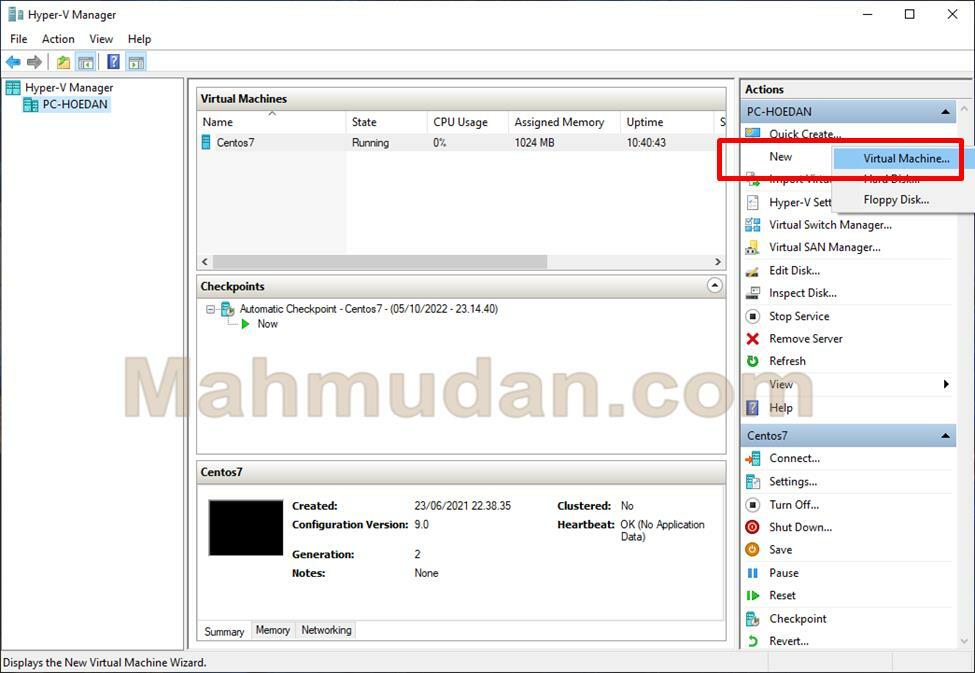
Here is the window Virtual Machine Wizard. In creating a Windows-7 virtual machine, some settings need to be made, Therefore click Next
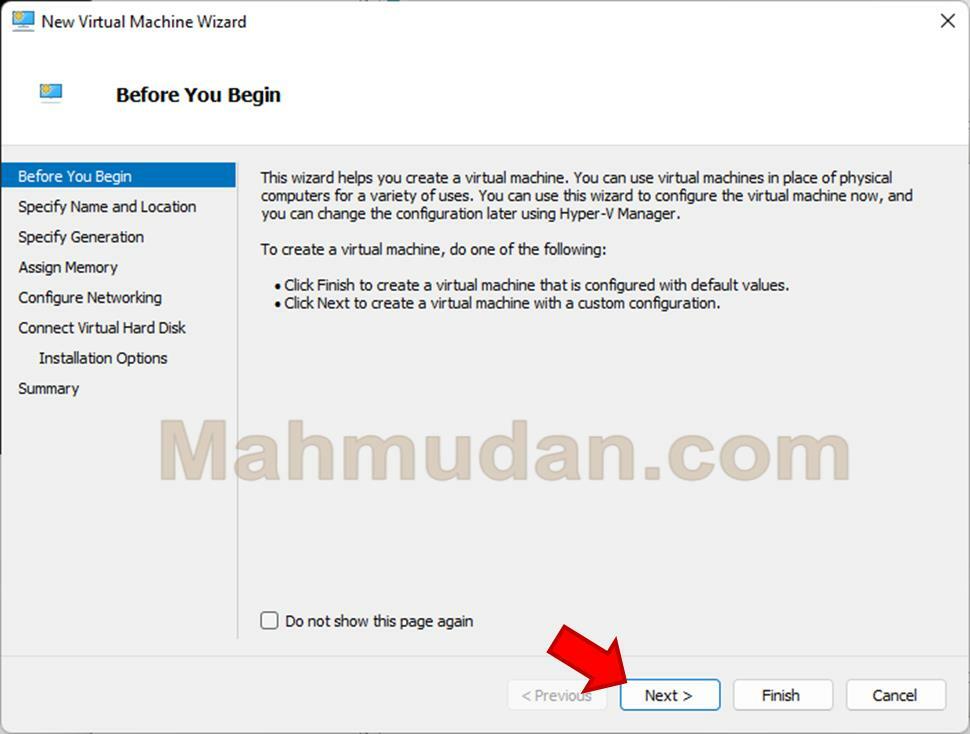
2. Specify the Virtual Machine Name and Location.
The first step in Virtual Machine Wizard is to determine the name and location of the virtual machine that you will create.
On the field Name, type the name of the virtual machine, example: Windows-7. By default the virtual machine will be created on-premisesC:\ProgramDataMicrosoftWindowsHyper-V (green box). If you don't want to change the location of the virtual machine, click Nextto continue.
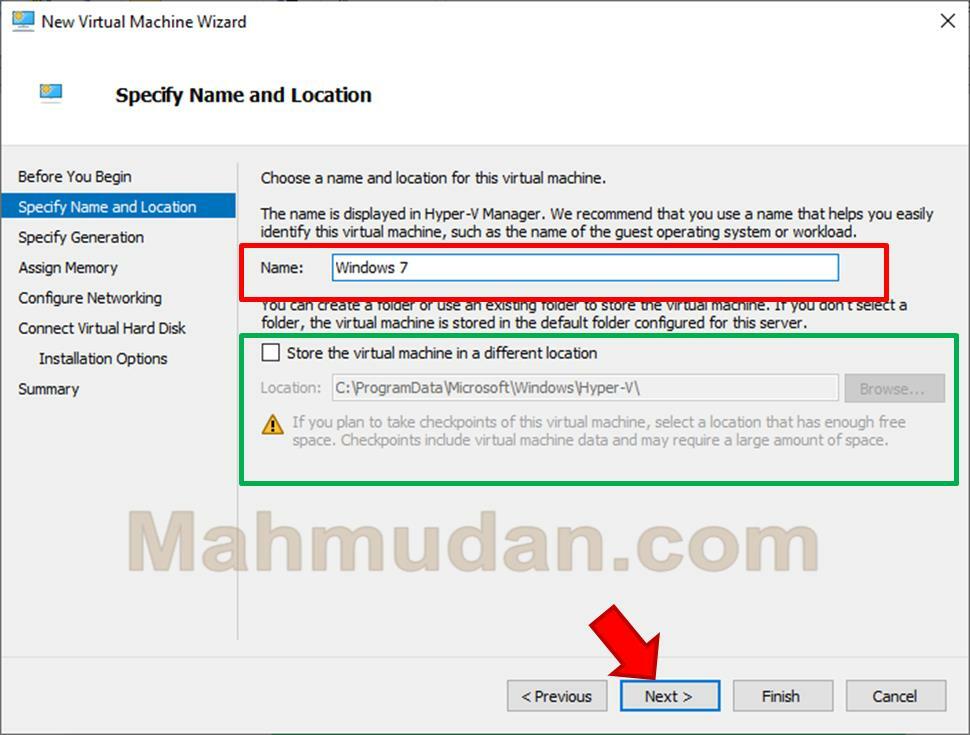
If you want to choose a different location, select Store the virtual machine in a different locatioan, then select the location via the button Browse, then click Next to continue.
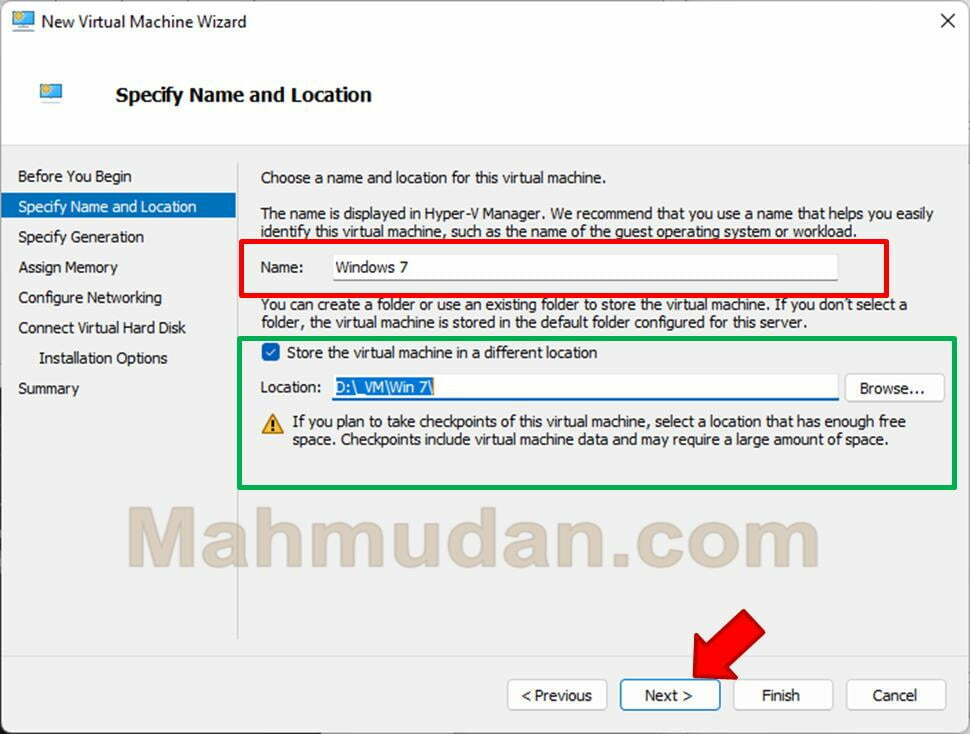
3. Select Virtual Machine Generation
Next is to choose the virtual machine generation. Windows-7 can only be run with first generation virtual machines, therefore choose Generation 1, then click Next to continue.
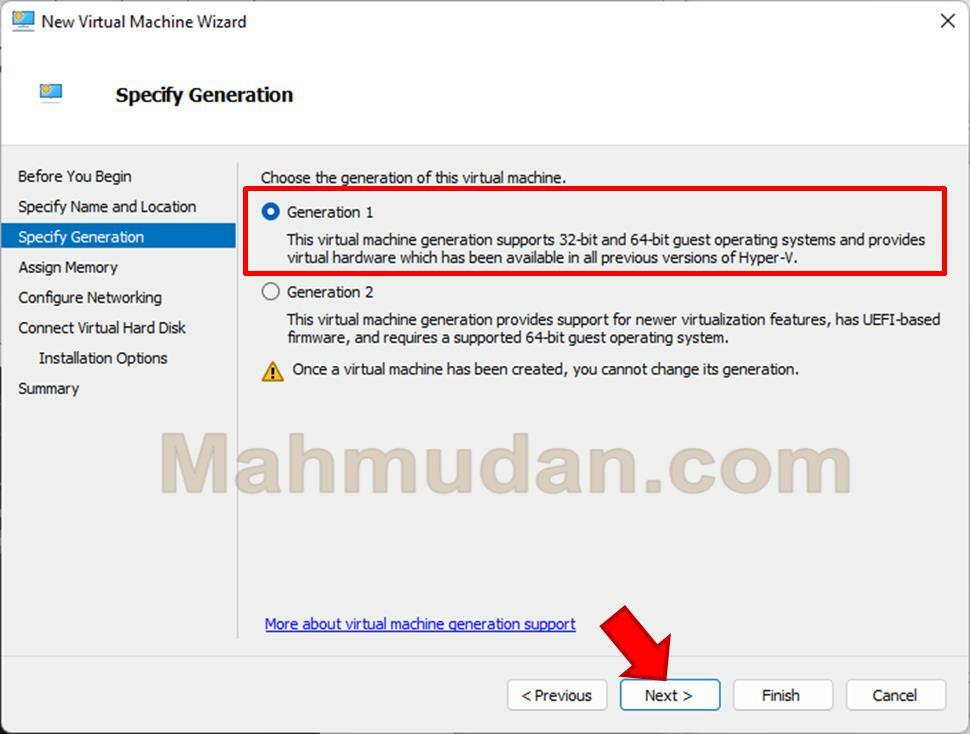
4. Determine the Memory Size of the Virtual Machine
Here, You can specify how much memory you want to allocate to the virtual machine. Keep in mind that the size you set will increase the used size of the physical computer memory when you run the virtual machine.
On the field Startup memory, enter the amount MB you want to allocate. For Windows-7, The memory required is the least 1GB or 1024MB, You can specify larger if your physical computer memory is large enough.
Select Use Dynamic Memory, then click Next to continue
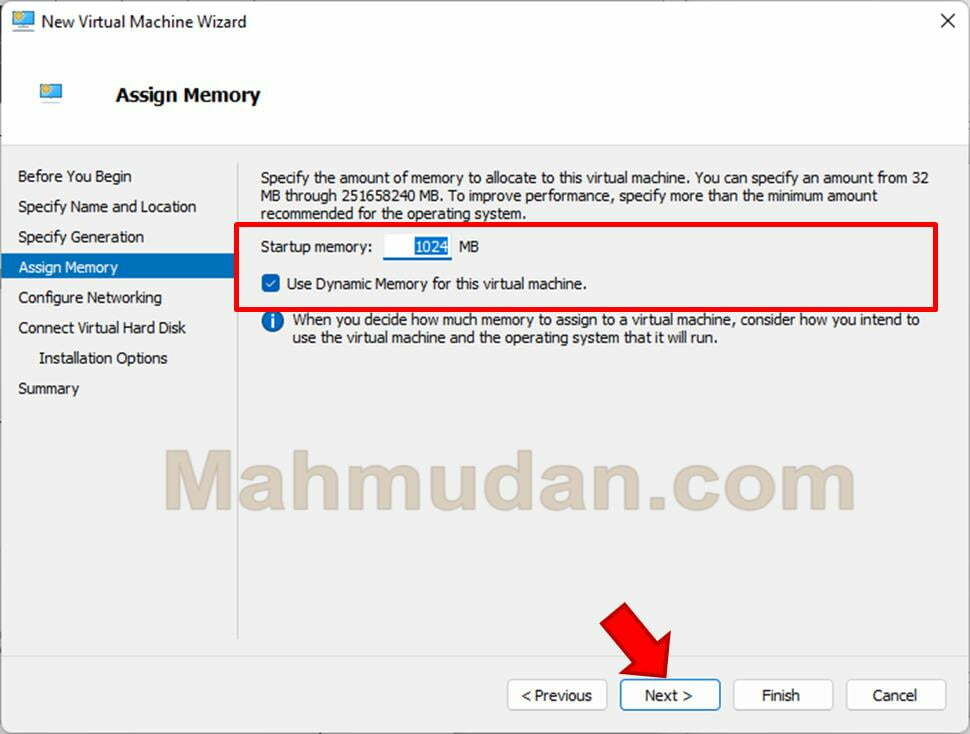
5. Virtual Machine Network Configuration
In this section, You can choose Not Connected and immediately proceed to the next stage. This step was selected because you have not yet created one virtual switch, and this is useless if you don't want the virtual machine connected to the network.
Once you have finished creating the Windows-7 virtual machine and running it, You still can Connecting Virtual Machines to the Network via settings.
Click Next to continue.
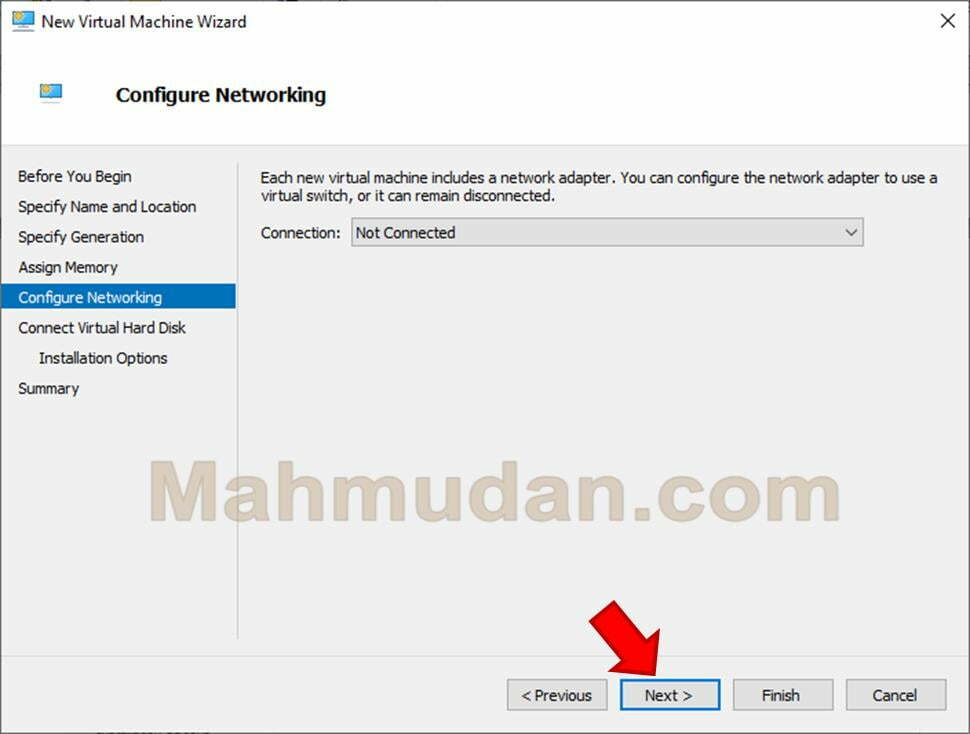
6. Connect a Virtual Hard Disk
If you already have a virtual hard disk and want to use it on this machine, select Use an existing virtual hard disk.
Assume that you don't have a virtual hard disk yet, therefore you need to create it. To create a virtual hard disk select Create a virtual hard disk then follow these steps:
- On the field Name, type the name of the virtual hard disk.
- On Location, select the location you want. Example: D:\MyVMWin7Win7Disk
- On the field Size, enter the number in GB you want to create. For Windows-7, The minimum hard disk size is 20GB
- Click Next to continue
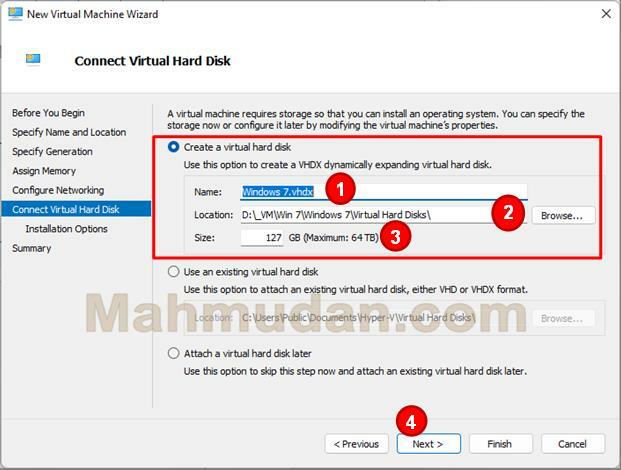
7. Determine Installation Options
In this installation option, do the following steps:
- Select Install an operating system from a bootable CD/DVD-ROM
- Select Image file(.iso), then select the location where the ISO Image (.iso) from the Windows-7 Operating System installation DVD via the button Browse
- Click Next to continue.
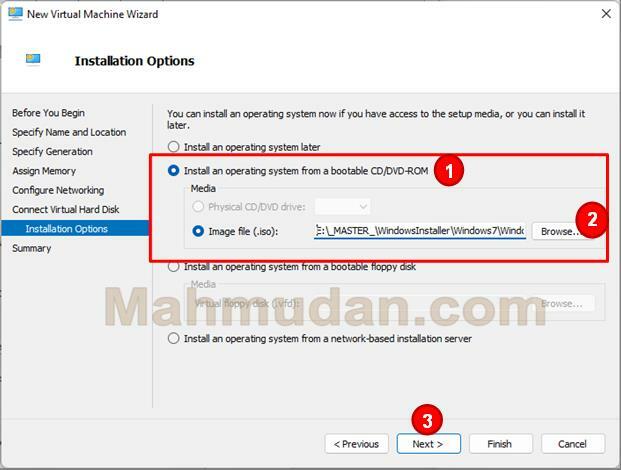
8. Completion of Virtual Machine Creation
Following is a summary of the virtual machine you will create. Click Finish to confirm completion of virtual machine configuration.
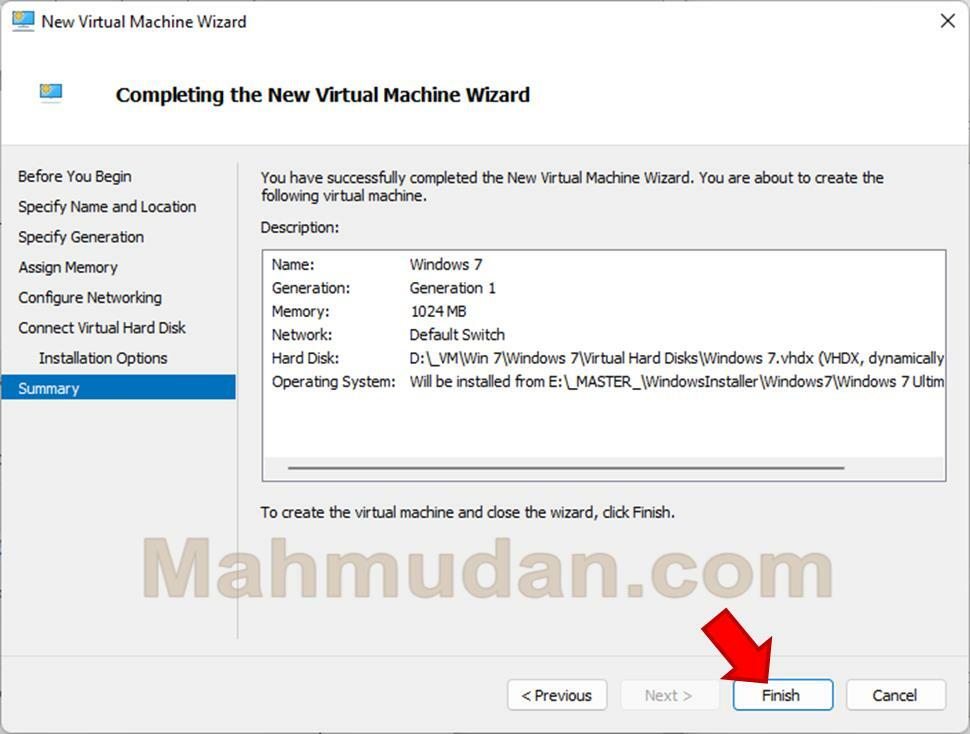
The next step is Connecting Virtual Machines to the Network, You can jump to a section Running a Virtual Machine if you want to run a virtual machine without connecting to the network.
Connecting Virtual Machines to the Network
To connect virtual machines to the network, You need to make one virtual network switch using Virtual Switch Manager.
1. Buka Virtual Switch Manager
Opening the Virtual Switch Manager is quite easy, back to Hyper-V Manager, then on section Action, select Virtual Switch Manager
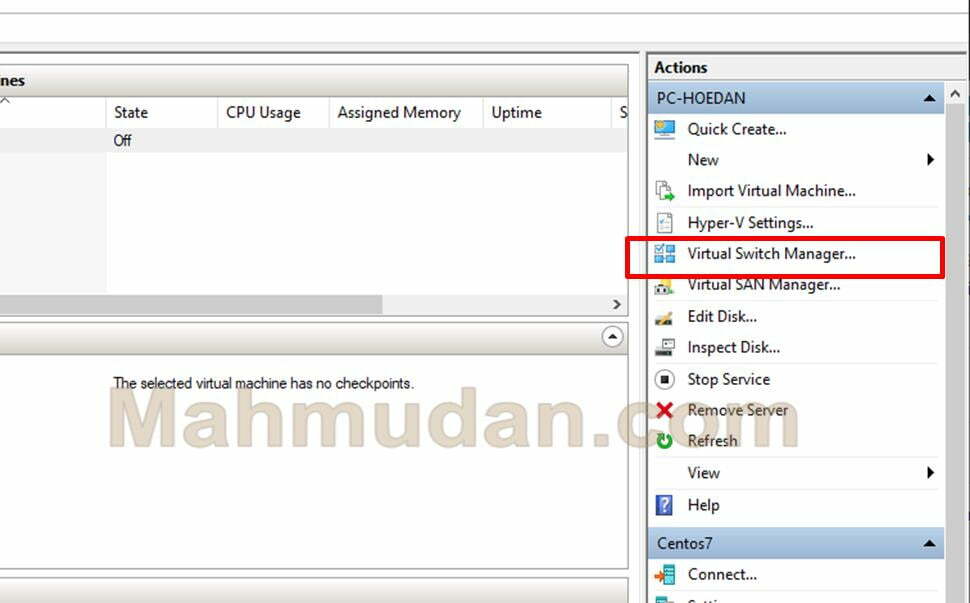
2. Create a New Virtual Switch
To create a new virtual switch, on Virtual Switch Manager do the following steps:
- In section Virtual Switches, click New virtual network switch
- In section Create virtual switch, select External
- Then click the button Create Virtual Switch
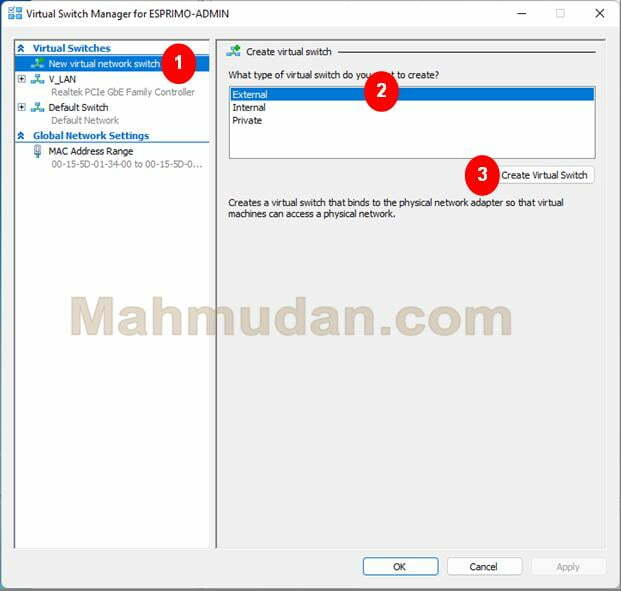
- On the field Name, type a name for the Virtual Switch, example: V_LAN
- On Connection type, select External network, select an available network device, then click Allow management operating system to share this network adapter
- Click OK to save
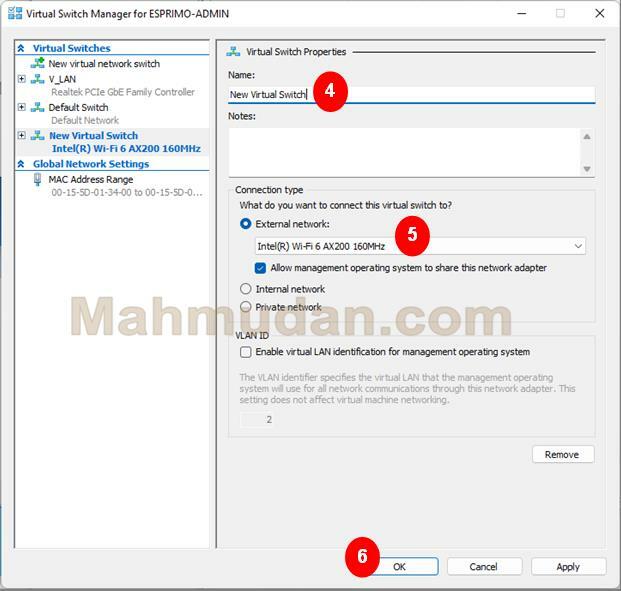
- If confirmation appears “Apply Network Change” click Yes
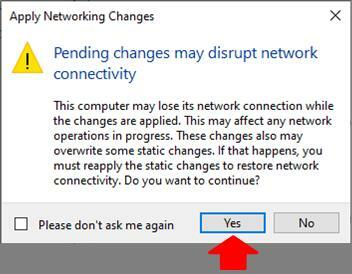
3. Change Network Settings on the Virtual Machine
If you have previously selected network configuration Not Connected for the virtual machine you created, You can make network configuration changes to Connected.
To change the network configuration of a virtual machine, on Hyper-V Manager, right click on the virtual machine name, then click Settings
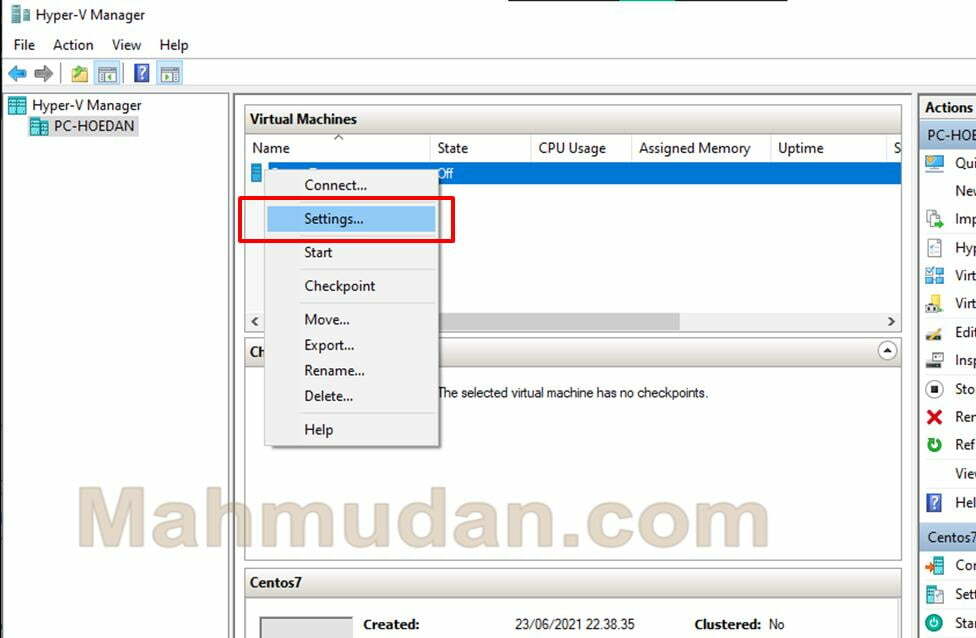
In the virtual machine settings, do the following:
- In section Hardware, select Network
- Then on Virtual switch, choose a name virtual switch that you have created.
- Click OK to apply.
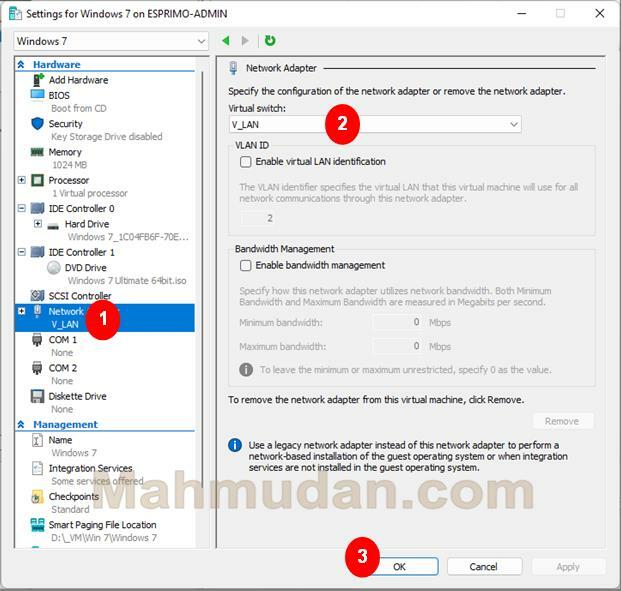
Network setup on the virtual machine has been completed. The next step is running a Windows-7 virtual machine.
Running a Virtual Machine
To run a virtual machine, do the following steps:
Open Hyper-V Manager, right click on the virtual machine name then click Connect… then the virtual machine screen will open.
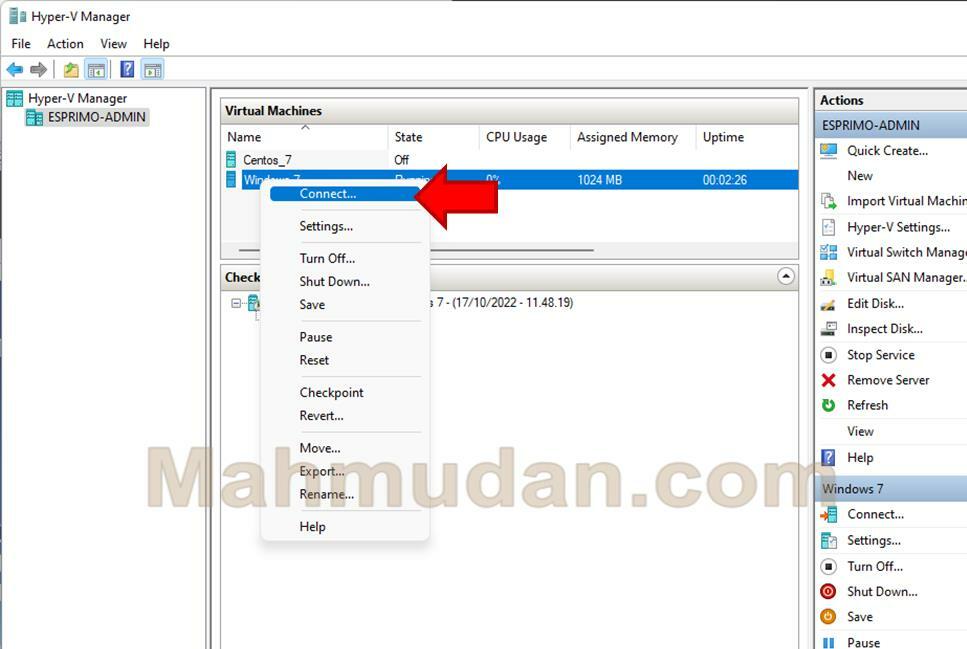
On the virtual machine screen, machine status in state Off , click Start to run a virtual machine.
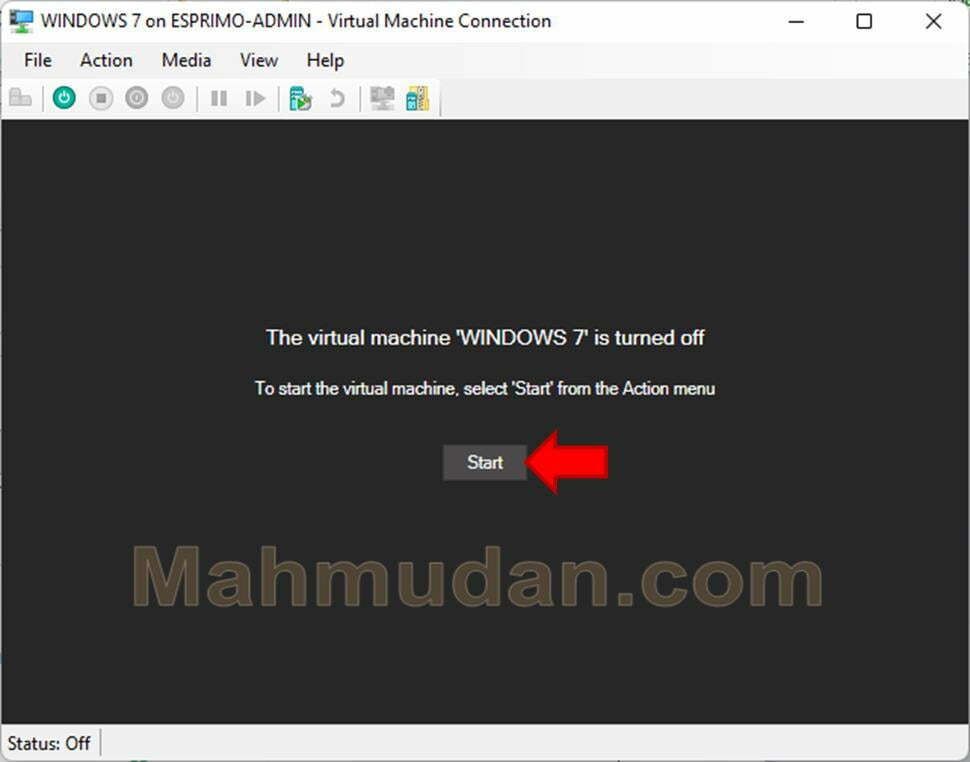
When the virtual machine is started, You will see the same process when running a physical computer. You can interact with the virtual machine via keyboard and mouse by clicking on the virtual machine screen.
You can start the process installing Windows 7 by pressing any button on the virtual machine screen.
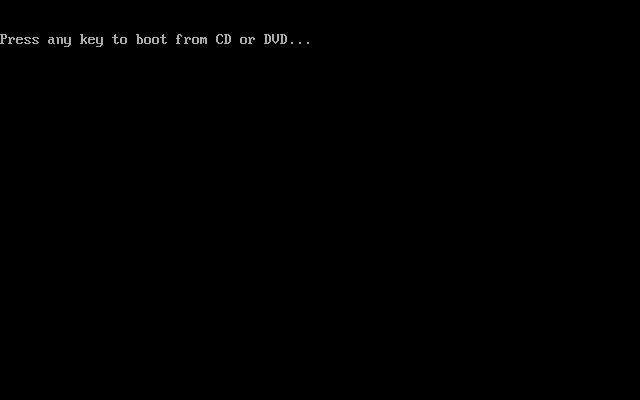
After process installing Windows 7 finished, The virtual machine will run like a normal computer.
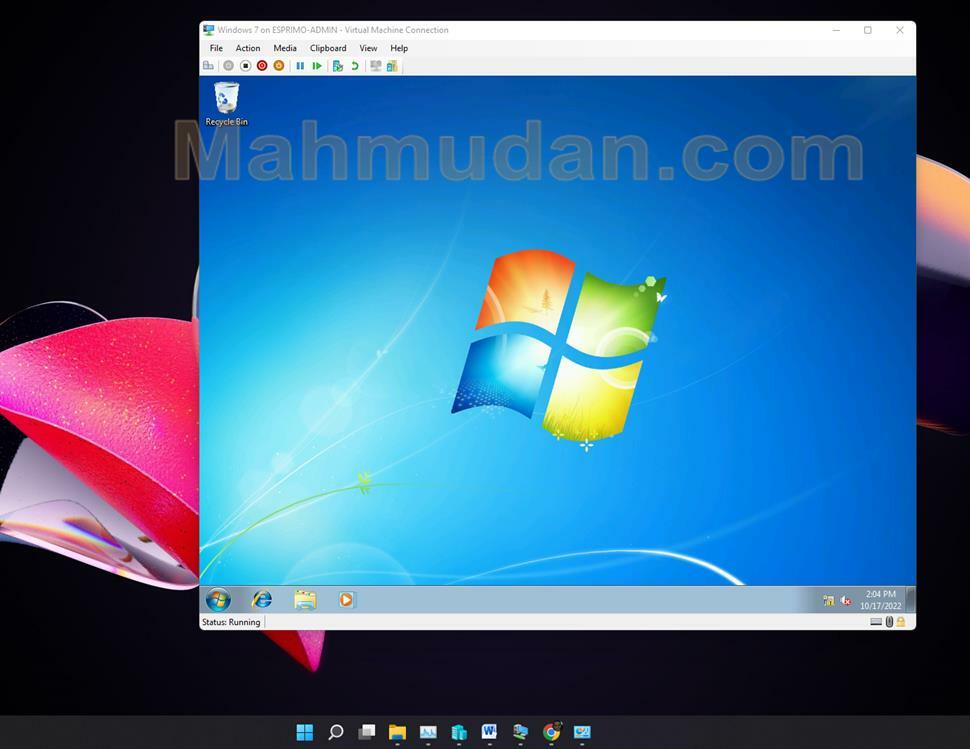
Finished
That's how to create a Windows-7 virtual machine using Hyper-V in Windows 10 or Windows 11. You can run a Windows-7 virtual machine simultaneously with several other virtual machines on a physical computer that you own. Each virtual machine acts like a complete computer.
Hope it is useful.

whoah thjs weblog is excellent i really like studying your articles.
Stay up the great work! You recognize, a lot of people are
looking round for this information, you could help them greatly.
Dude..
You are the best… your guide is so helpfull and usefull. Thank you so much.
Sir,
You are a genius!
Brilliant article.
Very clear.
Very comprehensive.
MANY THANKS!
Keren…
#ask bro
Can be done on all versions of Windows 11 like the educational version, home or only for the pro and enterprise versions, bro ? 😁😁🙏🙏